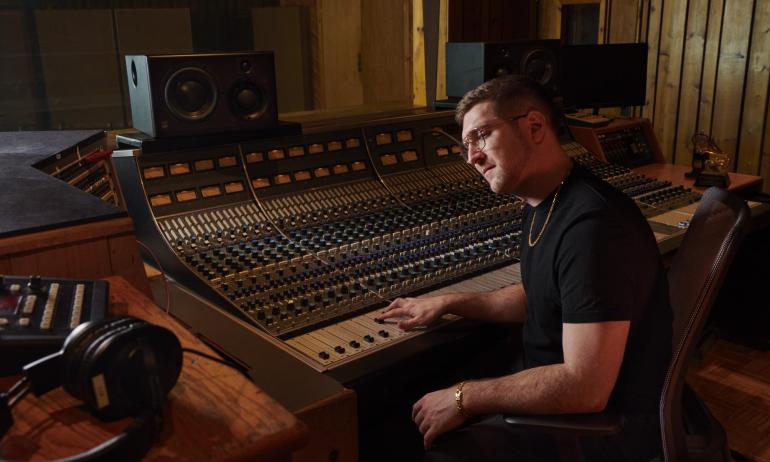Music Therapy Alumni Bring Joy to Clients via Telehealth

Meli Music staff (from left): Marlee Simon, Laura Fonseca, Melissa Sommers, and Marina Maiztegui.
Image courtesy of Meli Music
As the U.S. continues to navigate the coronavirus (COVID-19) outbreak, music therapists, like other mental health professionals, are adapting to new rhythms. The staff of Los Angeles-based Meli Music, which includes several Berklee alumni, shifted most of their therapy sessions to a virtual format in mid-March.
Several weeks later, they’re enjoying the chance to do a little (online) creative experimentation with their clients. We spoke with Meli Music CEO Melissa Sommers, and three Berklee alumni who are Meli staff members: Laura Fonseca B.M. ‘16, the company’s clinical director, and staff therapists Marlee Simon B.M. ’15 and Marina Maiztegui B.M. ’16. Below are excerpts from the conversation.
How did you decide to make the leap to telehealth so quickly?
Melissa Sommers: It’s actually been on my to-do list for a while—we had been talking about diversifying the opportunities we provide to clients, and the COVID-19 crisis kicked us into gear. We are using a HIPAA-compliant service so that we’re still in line with privacy guidelines for our clients, and of course we’ve had to distribute new consent forms for telehealth purposes. I’m so impressed with how both the team and our clients have been able to adapt. The majority of our clients opted into telehealth sessions, and we’ve actually gained a few new clients.
I’m seeing a lot of really cool family interactions. Some of the parents are even feeling more empowered to work on the goals with their children outside of our sessions.
—Laura Fonseca B.M. '16
How are your clients adjusting so far?
Marina Maiztegui: I’ve noticed a real sense of gratitude from the families I work with, because everyone’s going through a lot. Their kids aren’t going to school, and some of their other therapy services have been canceled. They are so grateful to have support during this part of their daily routine. The parents really appreciate that their kids are smiling and having a little bit of joy in their day.
Laura Fonseca: I’ve seen parents and families being more hands-on in sessions, because they’re all together in the same space. I can’t be there or assist the client, as I usually would, so the families are jumping in. I’m seeing a lot of really cool family interactions, and I think the parents appreciate getting to be a full part of a session. Some of them are even feeling more empowered to work on the goals with their children outside of our sessions. I’ve been typing up more detailed session plans and sending them to families, and I think that’s been really helpful.
Marlee Simon: Most of my clients are in a group therapy setting, and that’s been a different adjustment. Some of my groups are at an outpatient mental health facility, and we’re using Zoom Business for our sessions. People are logging on at the regular group times, and I’m trying to figure out what activities are useful in this format. It’s nice to see the clients in their comfortable home settings—sometimes they’re a little nervous when they come to the facility. They feel a bit more comfortable and able to share since they’re at home.
How is conducting an online session different from an in-person session?
Fonseca: It’s very different, energy-wise. Suddenly, you have to provide all the energy for the session, because you can’t really feed off the energy created by a client. You’d usually be at a five, in terms of energy level, and now you’re going up to a 10. Conversely, though, I find myself sitting in the same spot for hours—which is not typical for me. I’m a very interactive person in my sessions—moving around, usually—and trying to sit in one place but still interact with my clients is a challenge.
Sommers: I’ve noticed vocal strain after my sessions, because I’m trying to over-articulate my words. There’s a little extra pressure on wanting to present the material in the best way I can, virtually. I do a lot of work with older patients, at assisted-living facilities, and there’s been a learning curve for some of them with the technology. I’d definitely echo Laura about the energy. It’s a change not being able to feed off the client’s energy.
Simon: It’s a different schedule—on the one hand, I’m not sitting in traffic, or spending as much time traveling to and from sessions. But my partner and I are trying to figure out our schedules since we’re both working from home. I’ve been reminding myself to take breaks and go outside for walks, which helps.
Are you still conducting any sessions in person?
Maiztegui: I do some work at residential mental health facilities, and I’m still going to conduct those sessions in person. The centers have implemented a lot of changes—for example, the adolescents’ group I work with used to be about 30 kids, but they’ve split them up into several groups now. We’re trying to find ways to continue their treatment and find support. I’m trying to implement group activities that don’t involve sharing instruments, for example. We’re all trying to come up with new ideas and activities that will be beneficial.
How has the music therapy community responded to the recent changes?
Fonseca: I’ve talked to at least three different people from my class at Berklee, who have reached out once they saw we had made the switch to telehealth. They’re asking: How do we make this work at Boston Children’s Hospital? At a hospice company? Our team was ready to adapt and help the rest of the community in the ways that we can. It’s been great, seeing how the community of music therapists has been there for each other.
Maiztegui: I’ve been trading ideas with other music therapists for new activities for my residential groups. That’s been really helpful.
Fonseca: I think the key is asking: How do you adapt to any situation in the moment? That’s a real focus of the Berklee music therapy program, which has prepared us well for these times. We’ve been able to utilize our educations to help others who might need these ideas.




